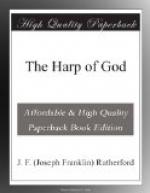[103]The apostle Paul speaks of these figures or pictures relating to the covenants, as follows: “For it is written, that Abraham had two sons, the one by a bondmaid, the other by a freewoman. But he who was of the bondwoman was born after the flesh; but he of the freewoman was by promise. Which things are an allegory: for these are the two covenants; the one from the mount Sinai, which gendereth to bondage, which is Agar. For this Agar is mount Sinai in Arabia, and answereth to Jerusalem which now is, and is in bondage with her children. But Jerusalem which is above is free, which is the mother of us all. For it is written, Rejoice, thou barren that bearest not; break forth and cry, thou that travailest not: for the desolate hath many more children than she which hath an husband. Now we, brethren, as Isaac was, are the children of promise.” (Galatians 4:22-28) Isaac pictures the entire Christ, head and body—Jesus the Head, the church the body members.
[104]It is noted that God’s covenant with Abraham stated that there would be an offspring or seed which would bless all the families of the earth. This seed is the Redeemer, Christ Jesus, the Savior of the world; and by adoption into the family of God the true Christians, the church, the members of Christ’s body, become a part of that seed. “And the scripture, foreseeing that God would justify the heathen through faith, preached before the gospel unto Abraham, saying, In thee shall all nations be blessed. Now to Abraham and his seed were the promises made. He saith not, And to seeds, as of many; but as of one, And to thy seed, which is Christ.”—Galatians 3:8,16.
[105]Before the blessing promised could come to the peoples of earth, the seed which was promised must first come. The Israelites, otherwise called Jews, therefore expected that one of the natural descendants of Abraham would become their king and that through that king and his kingdom all the nations of the earth would be blessed by receiving the benefits first given to them. For this reason the faithful Jews looked forward with great expectancy to the birth of the one who was to be their king. They based their hopes upon the repeated promise made by Jehovah. Without doubt it was thought by some that Isaac, the son of Abraham, would be the one through whom the blessing would come. “After the death of Abraham, God blessed his son Isaac; and Isaac dwelt by the well Lahai-roi.” (Genesis 25:11) When Isaac was about sixty years old there were born to him and his wife Rebekah two sons, twins, who were named by them Esau and Jacob.—Genesis 25:26.
[106]Isaac then went to live in the land of the Philistines, and while there, God said to him: “Sojourn in this land, and I will be with thee, and will bless thee; for unto thee, and unto thy seed, I will give all these countries, and I will perform the oath which I sware unto Abraham thy father; and I will make thy seed to multiply as the stars of heaven, and will give unto thy seed these countries; and in thy seed shall all the nations of the earth be blessed”. (Genesis 26:3,4) Thus the Abrahamic promise was renewed to Isaac. Before the death of Isaac, he pronounced his blessing upon his son Jacob, and Jacob thereby became the successor of his father to the Abrahamic promise.




